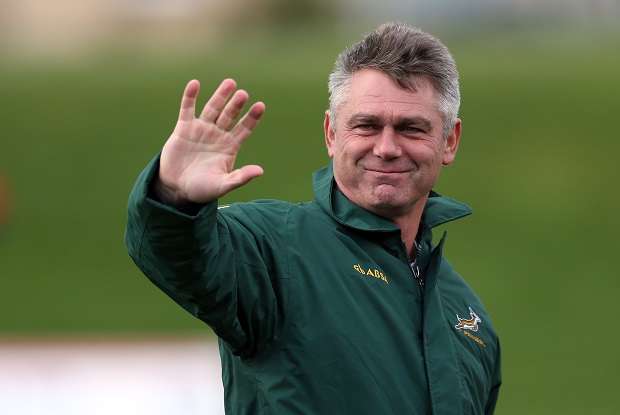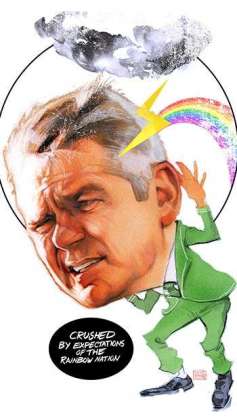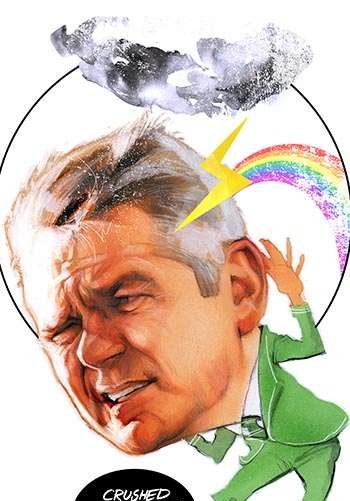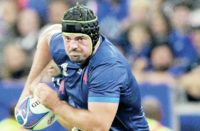 It's the impossible job. It's called coaching South Africa, and it's the one that Heyneke Meyer has just resigned from, falling on his sword before he was run-through by the politicians who wield the power in South African sport.
It's the impossible job. It's called coaching South Africa, and it's the one that Heyneke Meyer has just resigned from, falling on his sword before he was run-through by the politicians who wield the power in South African sport.
Meyer's resignation as Springbok coach came this week shortly after he had a meeting with O'Regan Hoskins, the South African Rugby Union's chief executive, and was told his time was up. Despite an almost 67 per cent
winning record during his four-year tenure, and third place in the 2015 World Cup – having lost 20-18 in the semi-finals to eventual champions New Zealand – Meyer was a dead man walking.
The huge lightning cloud hanging over Meyer, and the immediate future of South Africa as a competitive rugby nation, is the issue of “transformation”. This is the term used in South Africa for the policy of positive discrimination promoted by the ANC government.
Given the poisonous legacy of apartheid, in particular in sport, quotas for black and coloured players in South African national teams is a potentially incendiary issue. This was highlighted just before the World Cup when Cosatu, one of the country's biggest trade unions, campaigned for South Africa to be withdrawn from the tournament due to what they considered to be an unacceptably slow rate of transformation within the national rugby team.
Meyer was castigated for picking out of form/injured white players, like Leicester-bound captain Jean de Villiers, over up-and-coming young black and coloured players.
When a trade union is allowed to select a national team you know that the game is up, and fortunately wiser heads within the South African political establishment prevailed. Even so, the political backdrop was hardly conducive to Meyer's team taking the world by storm at the tournament.
The irony is that Meyer's selections had no fewer non-white players in them than those of Pieter de Villiers, his coloured predecessor as Springbok coach. Yet, there were no significant transformation bust-ups during his period in charge.
The horns of a dilemma skewering South African rugby is that every Springbok coach signs a contract which says that he must pursue transformation, while at the same time having to meet a performance clause with a win percentage believed to have a 70 per cent lower limit.
 The minimum number of players of colour in South Africa squad was set at 30 per cent for Meyer, and he met it by selecting nine non-whites in his World Cup squad. While transformation activists in South Africa were agitated by the fact that he only hit the minimum target, the star Springbok wing, Bryan Habana, who is coloured, supported Meyer.
The minimum number of players of colour in South Africa squad was set at 30 per cent for Meyer, and he met it by selecting nine non-whites in his World Cup squad. While transformation activists in South Africa were agitated by the fact that he only hit the minimum target, the star Springbok wing, Bryan Habana, who is coloured, supported Meyer.
Habana, playing in his third World Cup, said: “I'm fully behind Heyneke's standing in the situation, and wanting to make this World Cup a successful one for South Africa… having won in 2007, I know that when we are successful we unite the nation.”
However, any sense of a meritocracy in South African selection looks like being scuppered by a new government quota target for non-whites of 50 percent of the side by the 2019 World Cup – a figure to which SARU have acceded.
The rub is that many of the best elite players in South Africa still come from the white community 20 years after Nelson Mandela's symbolic wearing of Springbok captain Francois Pienaar's No.6 jersey at the 1995 World Cup.
The reality is that an enforced rate of transformation in a society with entrenched sports traditions is difficult, and while talented black and coloured players are coming through into the professional ranks in South Africa in increasing numbers, the rate has not been rapid.
The flip side of the coin is that many white players have gone overseas, especially to France and Britain, because of the lure of earning foreign currency, with the Rand currently trading at almost 22 to the pound sterling. Allied to this has been the realisation that, with transformation, their chances of the holy grail of a Springbok cap was less likely – explaining why the likes of Bernard le Roux and Scott Spedding are wearing the blue of France.
With South African rugby also divided by the old rivalries between the high-veld Afrikaner rugby strongholds of Jo'burg and Pretoria (now centred on the Lions and Bulls franchises) – where Meyer hails from – and those of the Western Cape (Stormers) and Natal (Sharks), there are further complications.
Now there is a sense that it is the turn of the Western Cape, with Allister Coetzee, who also ticks the transformation box as South Africa's leading non-white coach, the front-runner to replace Meyer. Coetzee, who was an assistant coach to Jake White when South Africa won the 2007 World Cup, enjoyed mixed fortunes as coach of the Stormers before joining Kobelco Steelers in Japan recently.
During his time at the Stormers, Coetzee threatened success but was unable to deliver a Super 15 title, and towards the end he was criticised for a team that played with a lack of ambition. However, having negotiated a break clause in his Japanese contract, Coetzee looks well-placed to answer the call – and SARU will be loathe to follow England's lead in appointing an overseas coach.
Coetzee also has a potential trump-card with Chester Williams, the coloured poster-boy for the 1995 Rainbow Nation campaign, looking for a coaching position in South African rugby after stints with Romania and Uganda. Should Coetzee forge an alliance with Williams, the World Cup-winning wing has the political kudos to clinch the deal.
Meyer's legion of critics also went to town on his flaws outside a solid winning percentage. They highlighted that not only did he fail to win the Rugby Championship, and lose seven out of eight times against arch-rivals New Zealand, he presided over the first ever defeat by Argentina – worse still, at home – and then the World Cup embarrassment against Japan.
Other names in the mix to replace Meyer include his assistant, Johann van Graan, who is highly-rated by the Springbok players, and Johan Ackermann, the former Springbok lock whose coaching has resurrected the Lions.
Whoever the new coaching regime, they can be sure of this. If the ANC's politicians insist on a 50 per cent transformation they will be staring down the barrel of a howitzer, charged with maintaining South Africa's standing as one of the world's leading rugby nations while saddled with unworkable quotas.
Should the new Springbok head coach succeed he will be the greatest of coaching magicians. If not, Meyer will reflect that he is well out of it.


























